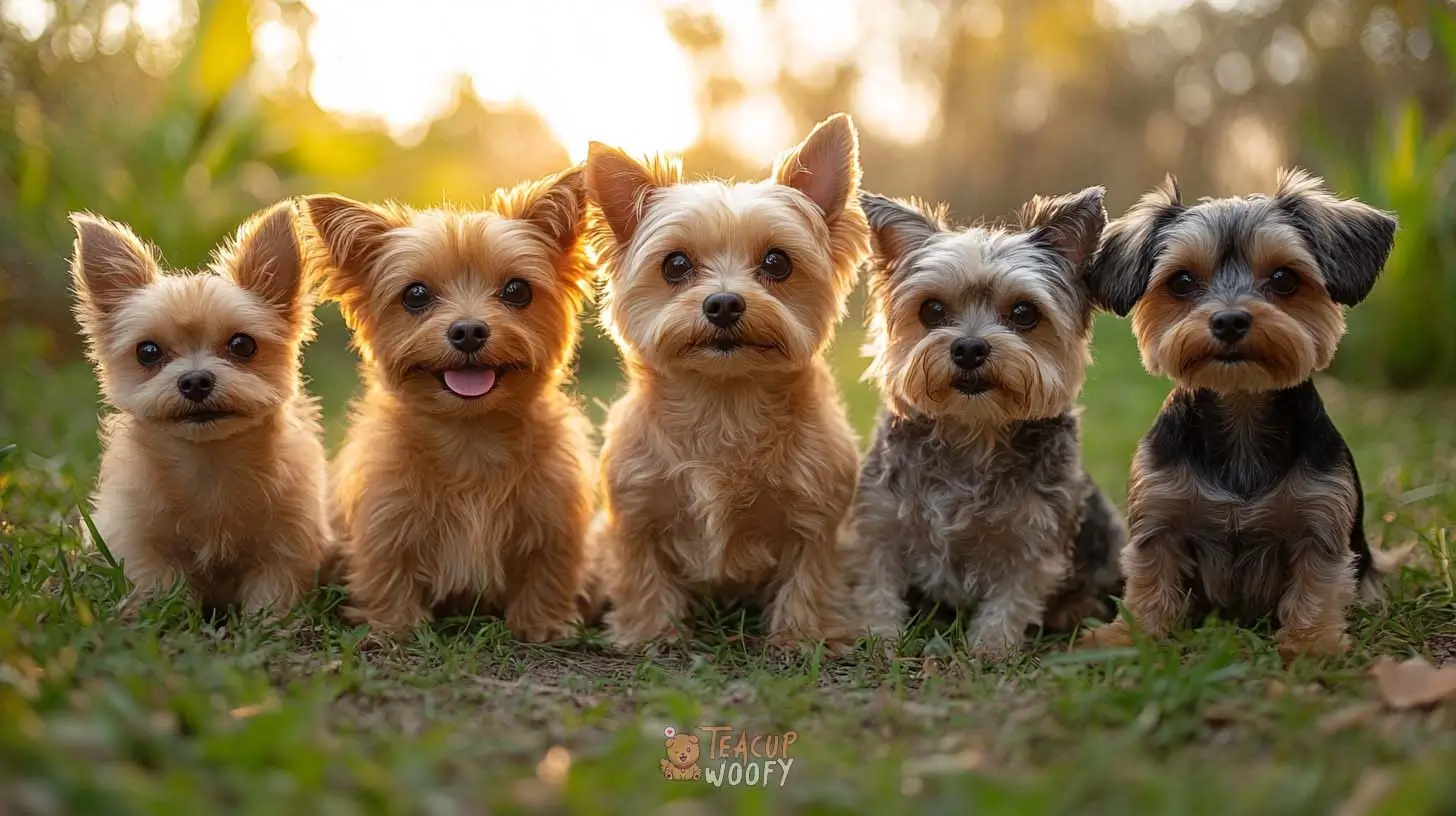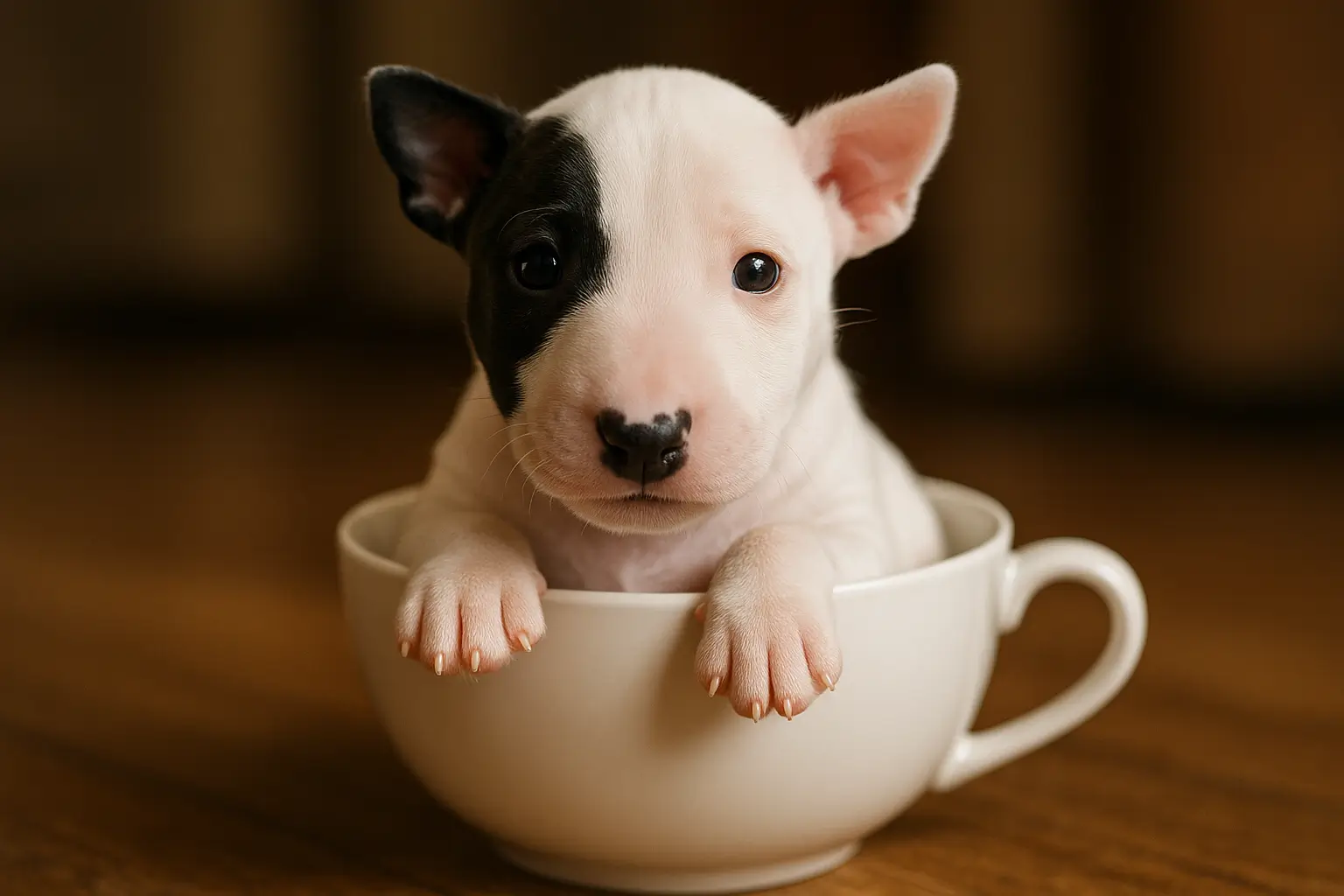If you’ve ever dreamed of a tiny, fluffy cloud bouncing around your living room, the teacup Bichon Frise puppy might be exactly what comes to mind. This little pup is a downsized version of the already small Bichon Frise, known for its cheerful personality, round dark eyes, and soft, cotton-like white coat.
The teacup Bichon isn’t an officially recognized size by the American Kennel Club, it’s a term breeders use for the smallest Bichon Frise puppies, usually weighing much less than the standard 10–18 pounds when fully grown. These pint-sized pups are bred selectively from the smallest parents, making them rarer and often more expensive.
Despite their tiny frames, teacup Bichon Frise puppies are full of energy, affection, and mischief. They’re playful, love being the center of attention, and thrive on companionship. This makes them perfect for apartment living or families who want a small dog that still has a big, bubbly personality.
Origin & History of the Teacup Bichon Frise Puppy

The Bichon Frise has one of the most charming histories among companion dogs. This breed’s roots trace back to the Mediterranean, where small, fluffy white dogs were popular among sailors and nobles as early as the 13th century. The Bichon is believed to have descended from the Barbet (a water spaniel) and small lapdogs brought across Europe.
By the Renaissance, the Bichon Frise became a favorite in French and Spanish royal courts. They were adored for their merry personalities, soft hypoallergenic coats, and ability to entertain. These little charmers were pampered pets of aristocrats, often seen in paintings and court life.
The modern standard Bichon Frise was recognized by the American Kennel Club in 1973, cementing its role as one of the most beloved toy breeds worldwide.
The teacup Bichon Frise puppy is a much newer variation. Unlike the recognized Bichon Frise, the “teacup” size isn’t an official category. Breeders selectively pair the smallest Bichons to create extra-small versions, often under 7–9 pounds full grown. This trend gained popularity in the 2000s, fueled by demand for toy and designer-sized pets, especially among city dwellers and celebrities.
Size & Appearance of the Teacup Bichon Frise Puppy
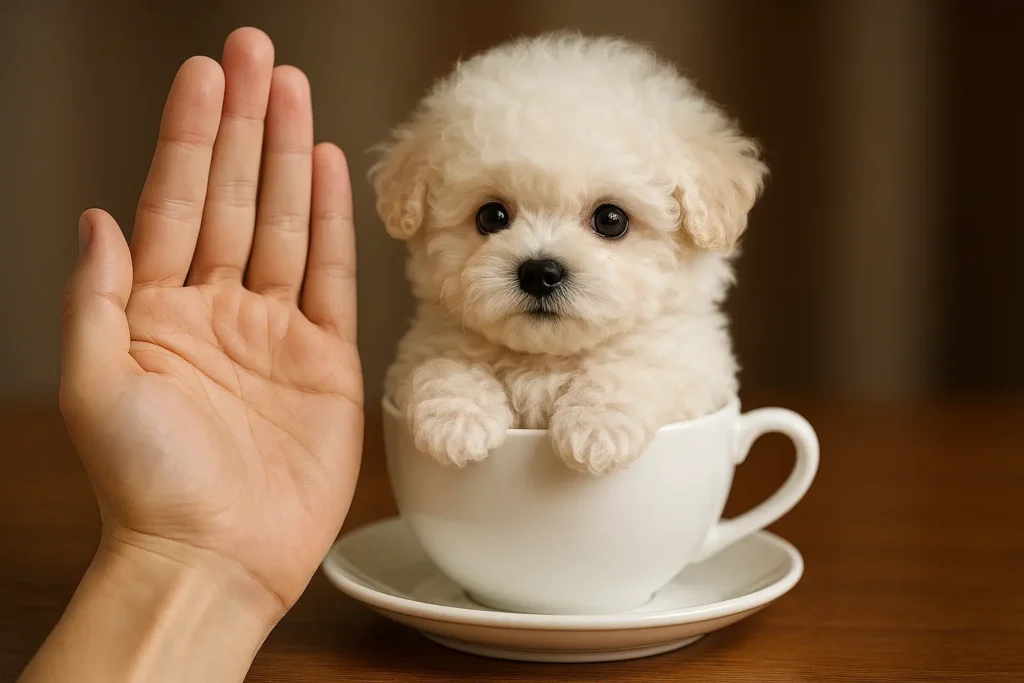
The teacup Bichon Frise puppy is often described as a living cotton ball, soft, fluffy, and irresistibly cute. They keep the same adorable features of a standard Bichon, like their bright dark eyes, rounded head shape, and plush double coat, but in a much tinier body.
Coat Variants of the Dog
Teacup Bichons, like their standard cousins, have a curly, hypoallergenic double coat that’s soft to the touch and doesn’t shed much. Coat types include:
- Curly/wooly: Dense curls, the classic Bichon look.
- Wavy: Softer waves with less curl.
- Teddy bear cut: A grooming style, not a natural coat, but very popular for teacups.
Colors are almost always pure white, though cream, apricot, or gray shadings may appear around the ears or body.
Dog Growth and Weight Chart
Because “teacup” sizes aren’t officially recognized, these are approximate growth ranges based on downsized Bichons.
Male Teacup Bichon Frise Growth
| Age | Weight | Height (shoulder) |
| 8 weeks | 1.5 – 2 lbs | 4 – 5 in |
| 3 months | 2.5 – 4 lbs | 5 – 6 in |
| 6 months | 4 – 6 lbs | 6 – 7 in |
| 9 months | 5 – 7 lbs | 7 – 8 in |
| 12 months (adult) | 6 – 9 lbs | 8 – 9 in |
Female Teacup Bichon Frise Growth
| Age | Weight | Height (shoulder) |
| 8 weeks | 1 – 1.8 lbs | 3.5 – 4.5 in |
| 3 months | 2 – 3.5 lbs | 4.5 – 5.5 in |
| 6 months | 3.5 – 5.5 lbs | 5.5 – 6.5 in |
| 9 months | 4.5 – 6.5 lbs | 6.5 – 7.5 in |
| 12 months (adult) | 5 – 8 lbs | 7 – 8.5 in |
When Will the Dog Stop Growing?
Most teacup Bichon Frise puppies reach their full height by 8–9 months, but they continue to fill out in weight until around 12 months old. By their first birthday, they’re considered fully grown.
What Is the Size of a Full-Grown Dog?
A full-grown teacup Bichon Frise typically weighs 5–9 pounds and stands 7–9 inches tall at the shoulder, much smaller than the standard Bichon Frise, which is usually 10–18 pounds and 9.5–11.5 inches tall.
Tiny as they are, teacup Bichons keep the same cheerful, fluffy look of their bigger cousins, just in a perfectly portable size.
Teacup Bichon Frise Puppy: Breed Overview
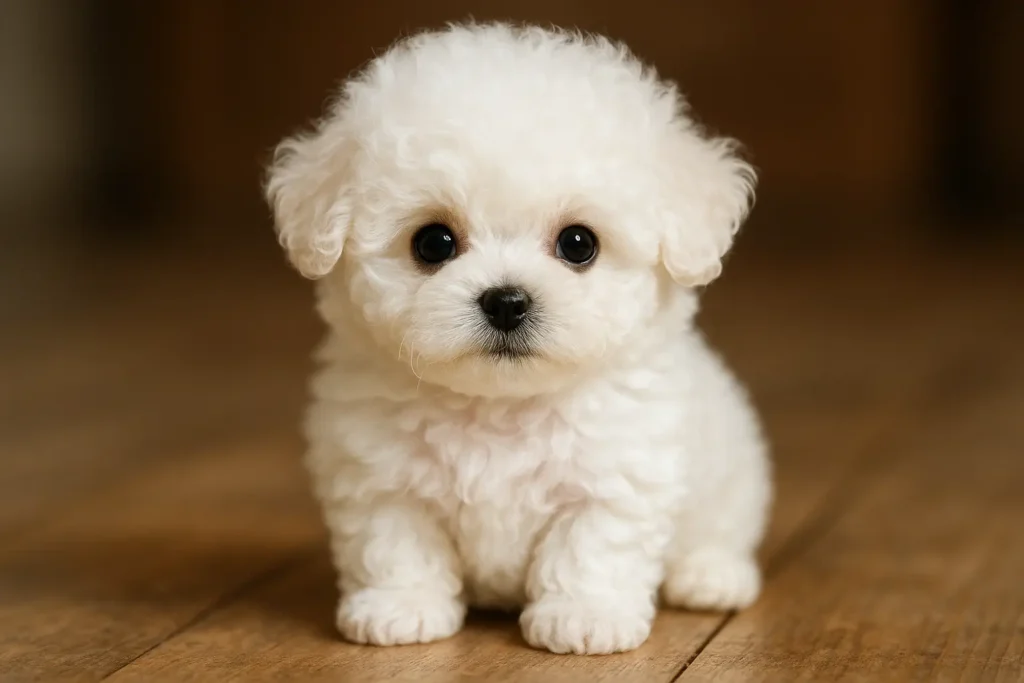
Here’s a quick guide to the essentials of the teacup Bichon Frise, everything you need to know in one place.
Size
Extra small, usually 5–9 pounds full-grown and 7–9 inches tall at the shoulder.
Group
The standard Bichon belongs to the Non-Sporting Group. The teacup Bichon isn’t officially recognized, but it’s considered a toy-sized companion dog.
Height
- Males: 8–9 inches
- Females: 7–8.5 inches
Weight
- Males: 6–9 pounds
- Females: 5–8 pounds
Coat
Dense double coat with a soft undercoat and curly/wavy outer coat. Plush, fluffy, and hypoallergenic.
Coat Color
- Predominantly white
- Cream, apricot, or light gray shading around the ears or body sometimes occurs
Lifespan
On average 12–15 years. With excellent care, some teacup Bichons can live up to 16 years.
Temperament
- Cheerful and playful
- Affectionate and people-oriented
- Gentle, but also a bit mischievous
- Gets along well with families, seniors, and other pets
Hypoallergenic?
Yes, The teacup Bichon has a low-shedding, hypoallergenic coat, making it a good option for allergy sufferers.
Origin
Descended from Mediterranean lapdogs and later adored by French and Spanish royalty, the Bichon Frise was bred as a companion dog. The “teacup” size is a modern downsizing trend, developed by pairing smaller Bichons for city and apartment living.
Price
A teacup Bichon Frise puppy usually costs between $2,500 and $5,000 USD, depending on breeder reputation, size, and lineage.
Average Monthly Expenses
- Food: $30–$50
- Grooming: $40–$80 (they require regular professional grooming)
- Veterinary: $50–$100 (averaged monthly)
Total: $120–$230/month
Teacup Bichon Frise Puppy: Breed Characteristics
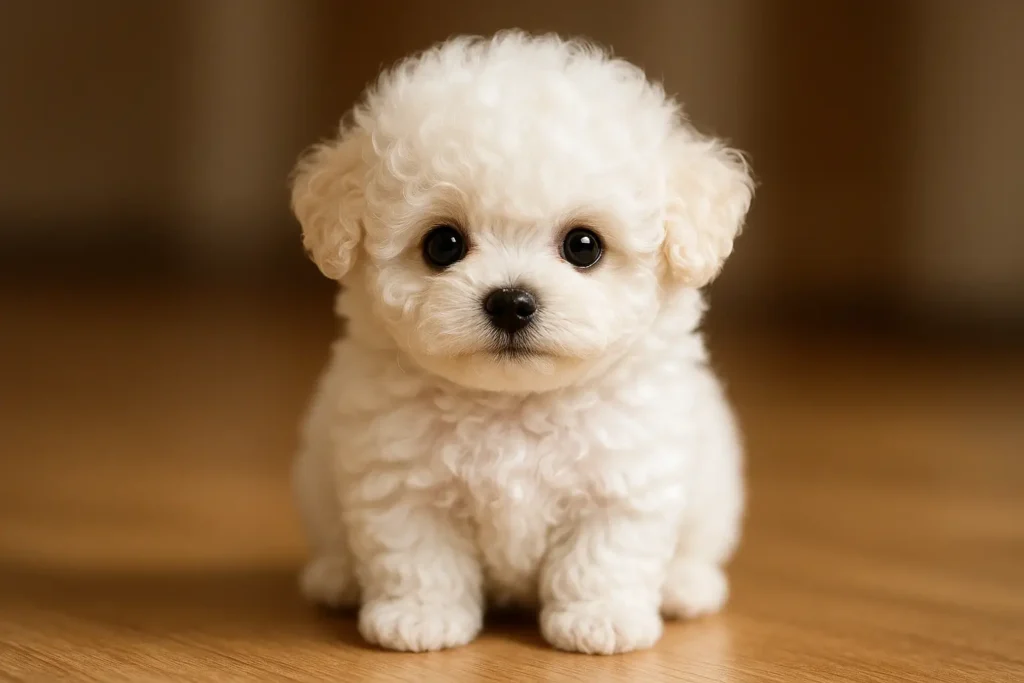
The teacup Bichon Frise puppy may be tiny, but its personality is larger than life. This little fluffball combines charm, playfulness, and affection, making it one of the most beloved toy-sized companion dogs. Here’s a breakdown of its key traits.
Affection Level
Very high. Teacup Bichons love to cuddle, follow their people around, and soak up attention.
Friendliness
Extremely friendly. They get along with most people and are quick to greet with a wag and a bounce.
Kid-Friendly
Best with older, gentle children. Their small size makes them fragile, so toddlers may accidentally play too rough.
Pet-Friendly
Generally excellent with other dogs and even cats, especially if raised together.
Exercise Needs
Low to moderate. They need 20–30 minutes of daily activity (short walks, indoor play, or fetch).
Playfulness
Very playful. Teacup Bichons love toys, games, and attention, and will often act like puppies well into adulthood.
Energy Level
Moderate. They have bursts of energy but balance it with plenty of snuggle time.
Health
Fair. While standard Bichons are generally healthy, teacup versions can face health risks like dental crowding, hypoglycemia, and fragile bones.
Sociability
High. They’re social butterflies and don’t like being left alone for long hours.
Trainability
Moderate. They’re smart and eager to please, but sometimes stubborn. Short, positive training sessions work best.
Intelligence
Above average. They pick up tricks and commands quickly but may test boundaries if training is inconsistent.
Tendency to Bark
Moderate. They’ll alert you to strangers or noises, but with training, excessive barking can be controlled.
Amount of Shedding
Low. Their hypoallergenic coat sheds minimally but requires regular grooming to prevent matting.
Temperament & Personality of the Teacup Bichon Frise Puppy
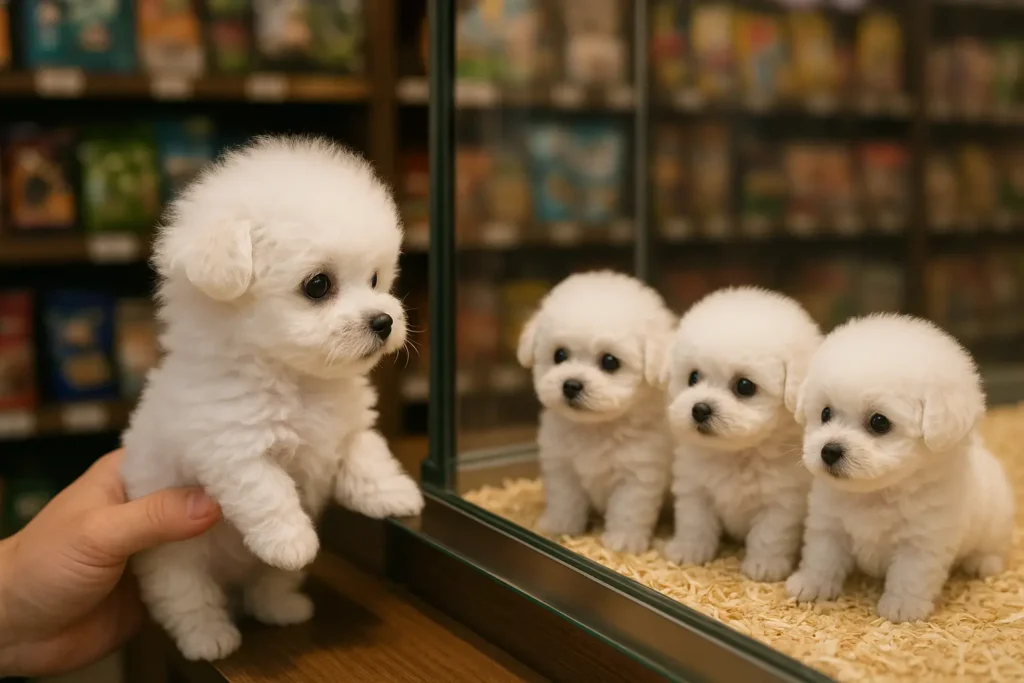
Living with a teacup Bichon Frise puppy honestly feels like having a little ball of sunshine in your home. These pups are tiny in size, but their personalities are huge, cheerful, sweet, and just the right amount of mischievous.
Cheerful Companions
Teacup Bichons are natural mood-lifters. They’re always wagging, bouncing, or trying to get your attention with their silly antics. It’s hard to feel down when this fluffy little goofball is prancing around the living room.
Loving and Affectionate
If you’re looking for a cuddle buddy, you’ve got one. These pups bond deeply with their families and love being lap dogs. They’re happiest when they’re right by your side, whether you’re working at your desk or watching TV.
Social Butterflies
Teacup Bichons thrive on companionship. They enjoy meeting new people and usually warm up quickly to strangers. They’re not the type to be shy or reserved; instead, they often greet newcomers with curiosity and friendliness.
Playful and Mischievous
Don’t let their angelic looks fool you, these puppies are little tricksters! They love to play and can get into mischief if left bored. Whether it’s carrying socks around the house or turning a simple toy into an all-day game, they’ll keep you laughing.
Sensitive but Resilient
They’re sensitive to harsh tones or rough handling, so positive reinforcement is the way to go. Despite their fragile size, they’re surprisingly resilient when it comes to adapting to new homes, routines, and people.
Dog Behavior: Teacup Bichon Frise Puppy
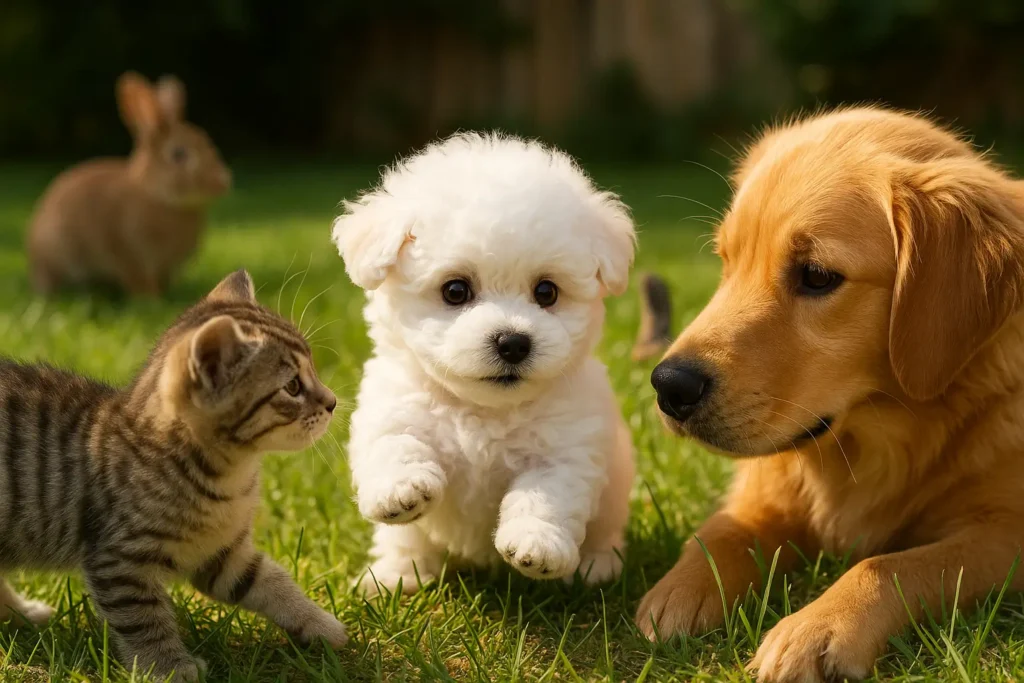
The teacup Bichon Frise puppy may be small enough to carry in one hand, but their behavior fills the whole room. These little fluffballs are known for being joyful, affectionate, and just a bit cheeky. Here’s what you can expect from their everyday behavior.
Everyday Behavior
Teacup Bichons are active but not hyper. They’ll happily trot around the house, follow you from room to room, and curl up for naps in between play sessions. They’re curious explorers, so don’t be surprised if you catch them sniffing around bags, laundry, or anywhere they can poke their little noses.
With Family
These pups are extremely people-oriented. They want to be included in everything, whether that’s cooking dinner, watching TV, or even heading to the bathroom. They thrive on closeness and may get anxious if left alone for long stretches.
With Strangers
Teacup Bichon puppies are naturally friendly and outgoing. While they may bark a little at first, they quickly warm up and often greet guests with tail wags and wiggles.
With Other Pets
Generally great with other dogs and even cats, especially when socialized early. Their playful nature makes them good companions, but their tiny size means supervision is needed during rough play.
Training & Habits
They’re smart but can be a touch stubborn, so short, positive training sessions work best. Housebreaking may take patience since tiny bladders mean frequent potty breaks. Consistency and praise are key.
Cost of Buying Teacup Bichon Frise Puppies
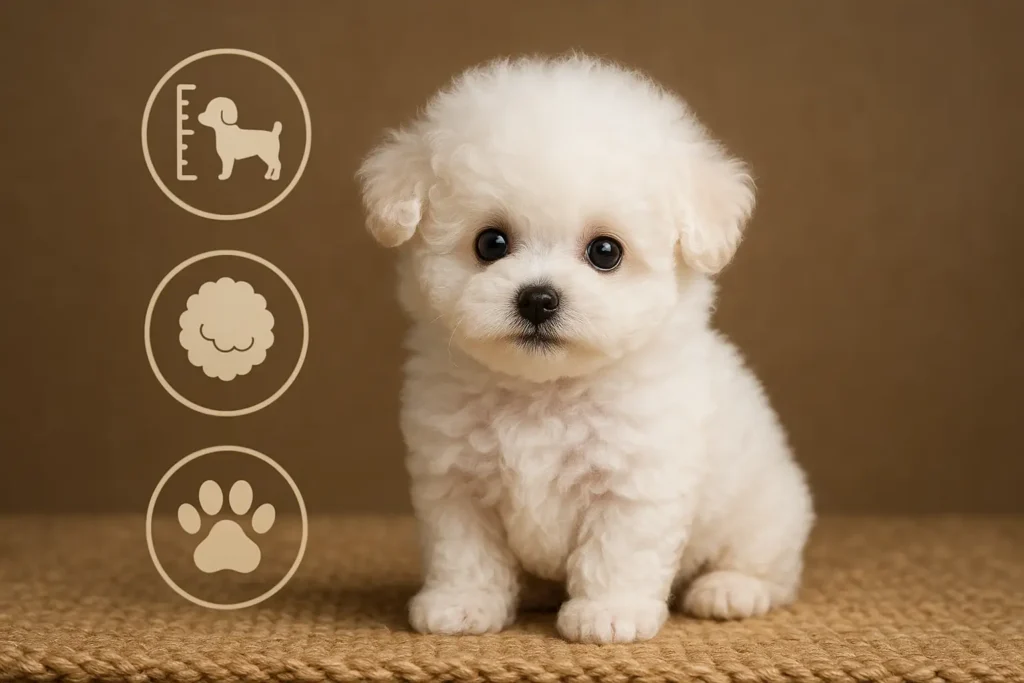
- Some breeders list Mini Bichon Frise puppies for $4,500 to $7,000 USD. Kim’s Pups
- Others are offering “teacup/mini” versions for around $3,000 to $3,400 USD.
- Some very rare or specialty ones (show quality, rare color, special lineage) can go even higher than that.
- More standard Bichon Frise puppies (non-teacup, less “designer/mini” claims) often run between $1,000 to $3,000 USD, depending on breeder reputation, health screenings, and location.
What to Know / Things That Affect Price
- “Teacup” size tends to be rare, which drives price up.
- Health guarantees, papers, vaccinations, breeder reputation all add to cost.
- Shipping / import costs if you’re buying from overseas or far away.
- Rare coat colors or small size (tiny than even mini standard) often cost more.
- Ethical breeder vs “designer puppy” factors: breeders who test for genetic health, socialization, etc., generally cost more.
Here’s what a typical monthly cost breakdown looks like for a teacup Bichon Frise puppy, specifically for food, veterinary, and grooming. These are rough estimates, based mostly on standard Bichon Frise cost data, adjusted down somewhat since teacup puppies eat less and may need simpler grooming from time to time. Your local costs in Tel Aviv might differ quite a bit.
Monthly Expenses: Teacup Bichon Frise Puppy
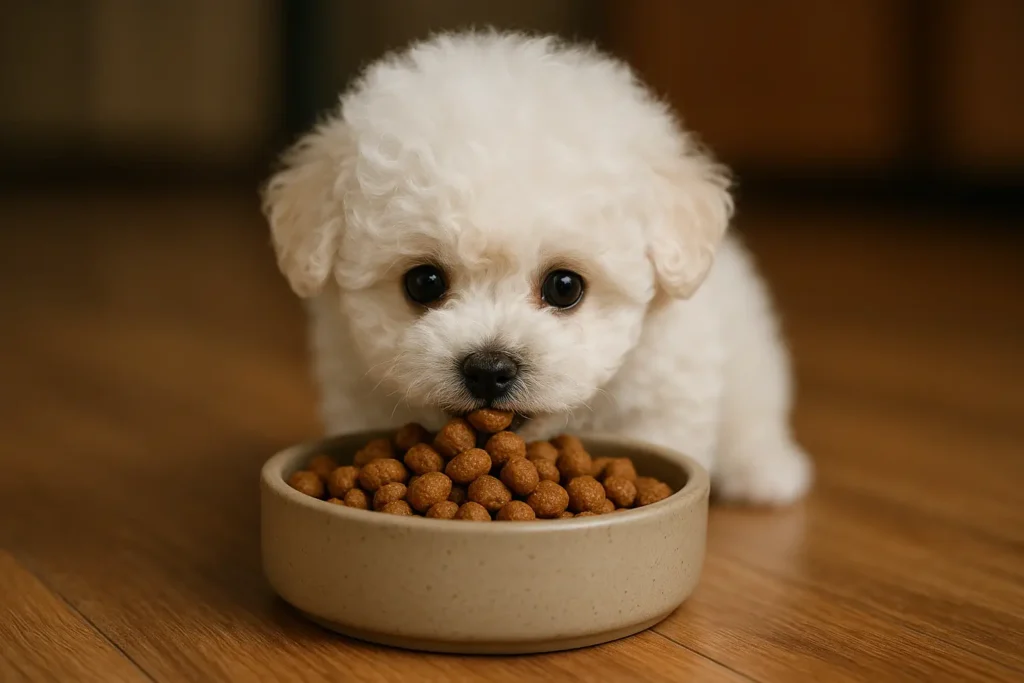
Food
- For a teacup Bichon puppy, you’ll feed smaller portions, so food costs are lower than for regular dogs. Using high-quality puppy kibble, expect to spend about US $20-$40/month.
- If you add toppers or wet food, that might push this higher.
Veterinary
- Routine vet costs like vaccinations, wellness checkups, parasite prevention (fleas/ticks/worms) generally run around US $30-$50/month for a Bichon.
- Puppies may have slightly higher veterinary costs early on because of more frequent vaccine boosters, deworming, etc.
Grooming
- Because Bichon Frise coats are fluffy and require frequent maintenance, grooming tends to not be cheap. For a small breed with a high-maintenance coat, groomer costs are often US $30-$60/month (professional groomer every 4-6 weeks + brushing and minor maintenance at home) for standard Bichons.
- If you do more grooming at home (brushing daily, bathing occasionally), you might reduce professional grooming frequency, which can lower the monthly grooming cost a bit.
Estimate Summary
Putting them together, here’s a rough monthly cost you can expect for those three categories:
- Food: $20-$40
- Veterinary: $30-$50
- Grooming: $30-$60
So, for a healthy teacup Bichon Frise puppy, you’re likely looking at US $80-$150/month just for food, vet, and grooming.
Diet and Nutrition for the Teacup Bichon Frise Puppy
The teacup Bichon Frise puppy may be small, but their nutritional needs are just as important as larger breeds. Feeding them properly supports healthy growth, prevents low blood sugar (a common risk in tiny dogs), and helps maintain their fluffy, hypoallergenic coats.
Monthly Food Expenses
Expect to spend around $20–$40 per month on high-quality puppy food for a teacup Bichon. Premium brands or fresh food options may bring this closer to $50–$60 monthly.
Essential Nutrients
A balanced diet should provide:
- Protein (22–25% for puppies, 18–22% for adults): Builds muscle and supports growth.
- Fat (8–12% for puppies, 5–8% for adults): Supplies energy and keeps their coats shiny.
- Carbohydrates: Whole grains or veggies for energy.
- Calcium & phosphorus: Bone and teeth development.
- Vitamins A, E, C & B-complex: For skin, immune system, and metabolism.
- Omega-3 and Omega-6 fatty acids: Essential for coat and skin health.
Foods for Puppies
- High-quality small-breed puppy kibble (Royal Canin, Wellness CORE, Hill’s Science Diet Small Paws)
- Softened kibble with warm water or puppy-safe wet food
- Boiled chicken, salmon, pumpkin, or rice (as occasional toppers)
How much to feed:
- 3–4 small meals daily to prevent hypoglycemia
- Around ¼–½ cup of food per day, depending on age and weight
Foods for Adults
- Small-breed adult dog food (Blue Buffalo Small Breed, Orijen Small Breed, Merrick Lil’ Plates)
- Lean meats (chicken, turkey, fish)
- Cooked vegetables (carrots, peas, sweet potato)
- Occasional plain yogurt or blueberries as treats
How much to feed:
- 2 meals per day
- About ½–1 cup of food per day, depending on energy and weight
Calories per Day
- Puppies: 300–400 calories daily
- Adults: 250–350 calories daily
General guide: small dogs need about 40 calories per pound of body weight each day (AKC).
Breakdown of Macronutrients
- Protein: 22–25% (puppy), 18–22% (adult)
- Fat: 8–12% (puppy), 5–8% (adult)
- Carbs: 40–50% from healthy sources
- Fiber: 3–5% for digestion
Never Feed These Foods
- Chocolate
- Grapes & raisins
- Onions & garlic
- Xylitol (found in sugar-free gum, candy, or peanut butter)
- Cooked bones
- Fatty or salty foods
- Alcohol or caffeine
(Source: ASPCA)
Nutritional Tips
- Stick to a feeding schedule (avoid free-feeding).
- Provide fresh water at all times.
- Treats should not exceed 10% of daily calories.
- Use small-breed kibble to prevent choking and dental issues.
- Add omega-3 supplements for coat health.
- Introduce new foods gradually to avoid tummy upset.
Health of Teacup Bichon Frise Puppies

Caring for the health of teacup Bichon puppies takes dedication and awareness. While they’re happy, lively little dogs, their tiny size can make them more delicate than standard Bichons. Let’s break down what you need to know.
Average Monthly Expenses
On average, expect to spend $50–$100 per month on veterinary-related care when averaged over a year. This includes:
- Wellness exams
- Vaccines and boosters
- Parasite prevention (fleas, ticks, worms, heartworm)
- Dental cleanings and checkups
- Emergency savings or pet insurance (optional but recommended)
Overall Well-Being
Healthy teacup Bichons are cheerful, playful, and affectionate. They love to be around people, enjoy short play sessions, and nap in between. Their well-being depends on a balanced diet, consistent grooming, gentle handling, and regular medical checkups.
Common Health Problems
Due to their downsized breeding, teacup Bichons can face more health risks than the standard size, such as:
- Dental crowding: Small jaws mean crowded teeth and higher risk of gum disease.
- Patellar luxation: Knee cap slipping out of place.
- Hypoglycemia: Low blood sugar in young puppies if meals are skipped.
- Fragile bones: Prone to injury from falls or rough play.
- Skin allergies: Common in the Bichon breed, often from food or environment.
Energy Level
Moderate. They enjoy bursts of playtime but also love lounging and cuddling. They’re not marathon runners, but they do need short daily walks and interactive play.
Recognizing Stress
Signs your teacup Bichon is stressed:
- Excessive barking or whining
- Shaking or hiding
- Loss of appetite
- Destructive chewing or pacing
- Panting or licking paws
Keeping routines predictable, providing safe spaces, and giving lots of reassurance helps reduce stress.
Medical Care
- Puppies: Vet visits every few weeks for vaccines and wellness checks until 16 weeks old.
- Adults: Annual vet exams, dental care, and boosters.
- Seniors: Exams every 6 months, plus blood work and joint checks.
Vaccination Details
- Core vaccines: Rabies, Distemper, Parvovirus, Adenovirus
- Optional vaccines (based on lifestyle): Bordetella, Leptospirosis, Lyme
- Schedule:
- Puppies: 6–8 weeks (first shots), boosters every 3–4 weeks until 16 weeks
- Adults: Boosters every 1–3 years depending on vaccine type and vet guidance
Recommendations for Senior Teacup Bichons
As they age (around 8+ years), care should be adapted:
- Switch to senior dog food with fewer calories and added joint support
- Supplements like glucosamine and omega-3s for mobility and skin health
- Softer bedding for delicate joints
- Shorter, gentler walks but consistent exercise
- More frequent vet visits (every 6 months) to catch issues early
Care: Exercise Needs of Teacup Bichon Puppies
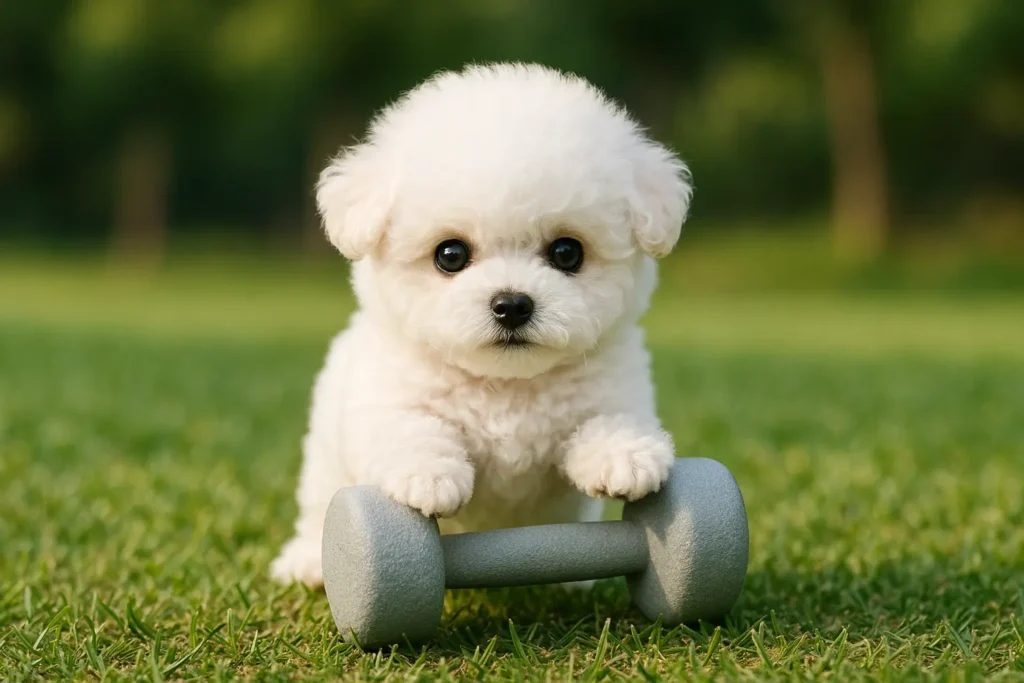
Even though teacup Bichon puppies are tiny, they still come with a lively, playful spirit. Their exercise requirements are not as demanding as larger breeds, but they do need daily activity to stay healthy, burn energy, and prevent boredom.
High Energy Level
Teacup Bichons aren’t hyper, but they do have a naturally cheerful and bouncy energy. They’ll surprise you with zoomies around the living room, then flop down for a nap like nothing happened.
Intensity
Their play style is moderate, they’re not aggressive players, but they can get excited easily. Because of their fragile size, exercise should be gentle and safe (no jumping off high furniture or rough wrestling with bigger dogs).
Exercise Needs
- 20–30 minutes daily of activity is usually enough
- Mix of short walks, indoor play, and light fetch games
- Mental stimulation (toys, training, puzzle feeders) is just as important as physical exercise
Potential for Playfulness
Teacup Bichons are natural clowns. They love interactive play, chasing small toys, and games that keep them close to their humans. Their playful personalities often continue well into adulthood, so they’ll always keep life lively.
Exercise Routine
- Puppies (under 6 months): 5–10 minutes of light play several times a day
- Adults: 1–2 short walks daily (10–15 minutes each) plus indoor play sessions
- Seniors: Short, slow walks and gentle play to keep joints healthy without strain
Keep sessions short and safe. Overexercising a teacup puppy can lead to hypoglycemia (low blood sugar) or joint strain. Always watch for signs of fatigue like heavy panting or slowing down.
Shedding in Teacup Bichon Frise Puppies
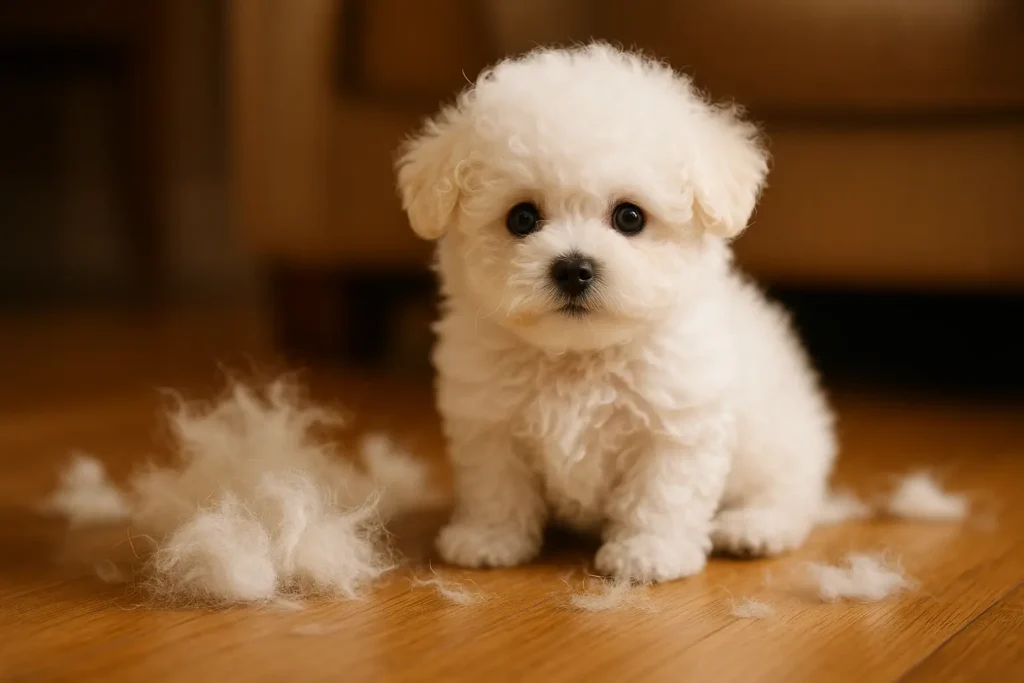
One of the biggest perks of owning a teacup Bichon Frise puppy is how little they shed compared to many other breeds. Their unique coat makes them a favorite for allergy-prone families and anyone who doesn’t want dog hair covering the couch.
Shedding Level
Teacup Bichons are considered low-shedding dogs. Instead of fur falling off around the house, their soft, curly double coat traps loose hair until it’s brushed out. This is why they’re often described as hypoallergenic.
Important note: Hypoallergenic doesn’t mean they never trigger allergies, but most allergy sufferers find Bichons easier to live with than heavy-shedding breeds like Labs or German Shepherds.
Coat Maintenance
Low shedding doesn’t mean low maintenance. Because loose hair gets caught in their coat, regular grooming is a must to prevent tangles and mats. Without brushing, their fluffy curls can quickly turn into knots.
- Brushing: 3–4 times per week with a slicker brush
- Bathing: Every 3–4 weeks with a gentle dog shampoo
- Professional grooming: Every 4–6 weeks for trims and coat shaping
Grooming Care for Teacup Bichon Frise Puppies
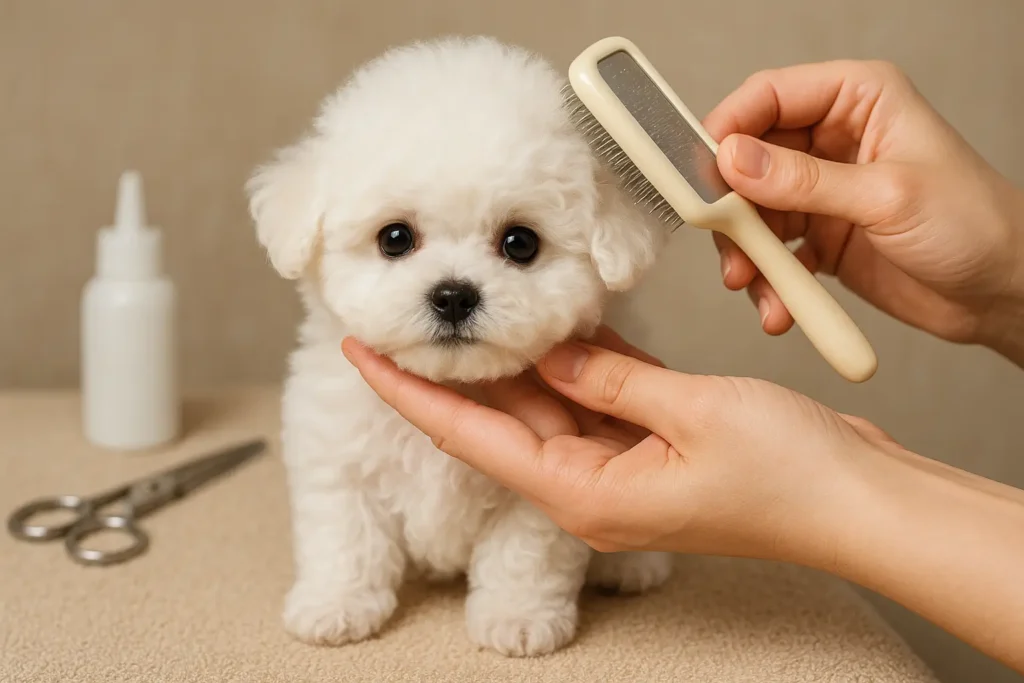
The teacup Bichon Frise puppy is known for its fluffy, cotton-like coat, but keeping it clean and healthy takes work. Grooming is not just about looks, it’s about health and comfort too.
Average Monthly Expenses
- Professional grooming (every 4–6 weeks): $40–$80
- At-home supplies (brushes, shampoo, wipes): $10–$20
Total monthly average: $50–$100 depending on how much you do at home vs at the groomer.
Benefits of Grooming
- Prevents painful mats and tangles
- Reduces risk of skin infections and hot spots
- Keeps coat fluffy and odor-free
- Helps spot health issues early (lumps, bumps, rashes)
- Keeps tear stains under control
Hygienic Checklist
- Brush 3–4 times weekly to prevent tangles
- Bathe every 3–4 weeks with a gentle, hypoallergenic shampoo
- Wipe eyes daily to prevent tear stains
- Clean ears weekly to avoid wax buildup
- Brush teeth daily or at least 3 times a week
- Trim nails every 3–4 weeks
Skin Care
Teacup Bichons can have sensitive skin. Use hypoallergenic shampoos and avoid harsh chemicals. Add omega-3 supplements for skin hydration and reduced itchiness.
Coat Care
Their double coat needs regular brushing with a slicker brush and comb to stay fluffy. Popular styles include the “puppy cut” (short, even trim) and the “teddy bear cut” (rounded, plush look).
Eye Care
Bichons are prone to tear staining, which shows up as reddish-brown marks under the eyes. Daily wiping with dog-safe wipes and keeping the eye area dry helps prevent staining.
Ear Care
Check ears weekly for wax, odor, or redness. Clean gently with vet-approved ear solution. Their fluffy hair can trap moisture, so keeping ears dry is essential to avoid infections.
Nail Care
Trim nails every 3–4 weeks. Long nails can cause discomfort, poor posture, or joint issues. For teacup Bichons, a nail grinder may be safer than clippers due to their tiny paws.
Adaptability of the Teacup Bichon Frise Puppy
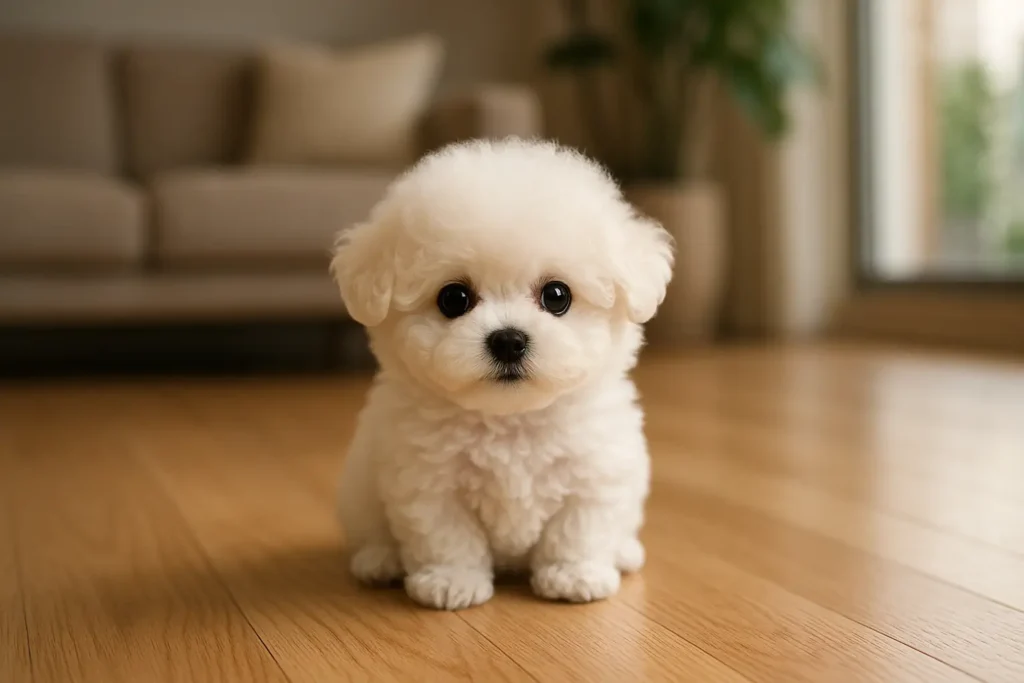
The teacup Bichon Frise puppy may be tiny, but it’s surprisingly adaptable to different living situations. Whether you’re in a small apartment or a busy family home, these little fluffballs adjust well, as long as they have companionship and care.
Adapts Well to Apartment Living
Yes, Teacup Bichons are ideal for apartment life. Their small size, moderate energy, and low-shedding coats make them easy to manage in tight spaces.
Tendency to Bark or Howl
Moderate. They’ll bark to alert you of strangers or new noises, but they’re not excessive barkers if trained early. Socialization and positive reinforcement help reduce unnecessary barking.
Good for Novice Dog Owners
Absolutely. Their gentle temperament, small size, and cheerful nature make them one of the best breeds for first-time owners. Just remember, grooming needs are high.
Sensitivity Level
High. Teacup Bichons are emotionally sensitive and pick up on their owner’s moods. Harsh tones or punishment can make them anxious, so gentle, consistent training works best.
Tolerates Being Alone
Low. These pups don’t like being left alone for long hours. They may develop separation anxiety if isolated too much, so they do best with owners who are home often or can arrange dog sitters/walks.
Tolerates Cold Weather
Low to moderate. Their fluffy coats offer some warmth, but their small bodies lose heat quickly. They’ll need sweaters or jackets for winter walks.
Tolerates Hot Weather
Moderate. They can handle mild heat but must be protected from overheating. Keep walks short in hot weather, always provide fresh water, and avoid midday sun.
All-Around Friendliness of Teacup Bichon Frise Puppies
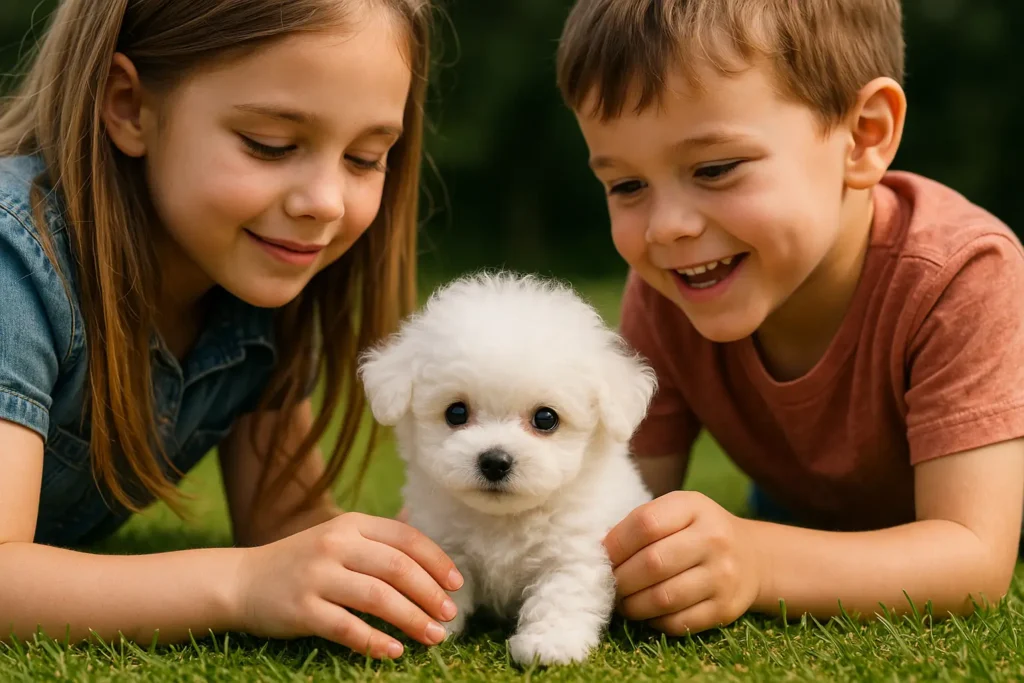
The teacup Bichon Frise puppy shines brightest when it comes to friendliness. These tiny fluffballs are social, affectionate, and naturally love being around people. They’re often described as “forever puppies” because their cheerful spirit never seems to fade.
Best Family Dogs
Yes, Teacup Bichon Frise puppies make excellent family companions. They thrive in homes where they’re included in daily life, whether that’s lounging on the couch, tagging along for errands in a carrier bag, or joining in playtime with the kids.
Kid-Friendly
These pups are great with children, especially older kids who know how to handle them gently. Their small size makes them fragile, so supervision is always recommended around toddlers. With the right guidance, they can be patient and loving playmates.
Dog Friendly
Teacup Bichons generally get along well with other dogs. They enjoy having a canine playmate, especially one with a similar gentle temperament. Early socialization helps them grow into confident, dog-friendly adults.
Friendly Towards Stranger
They’re naturally welcoming and curious. Teacup Bichons may bark a little when someone new comes in, but they usually warm up quickly and greet visitors with wagging tails and bouncy excitement.
Trainability of Teacup Bichon Frise Puppies
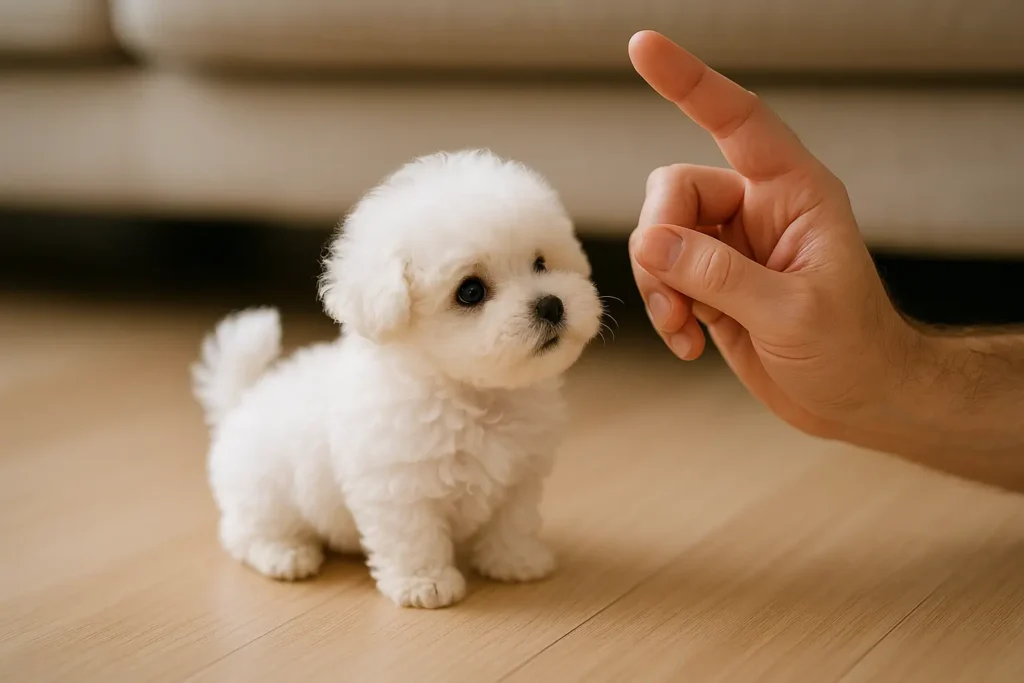
The teacup Bichon Frise puppy is a smart little companion, but like most toy breeds, training requires patience, consistency, and a gentle hand. Their eagerness to please is a big plus, but their playful streak can sometimes distract them.
Easy to Train
Teacup Bichons are generally easy to train when positive reinforcement is used. They respond well to treats, praise, and short, fun training sessions. Harsh discipline doesn’t work with them, it can make them anxious or stubborn. Housebreaking may take a little longer due to their tiny bladders, so frequent potty breaks are essential.
Intelligence
These pups are highly intelligent and quick to pick up tricks, commands, and routines. They enjoy learning when training is interactive and playful. Puzzle toys and games are excellent for keeping their minds sharp.
Potential for Mouthiness
Like many small breeds, teacup Bichon puppies may go through a mouthy stage, nibbling or chewing during play. Redirecting this behavior with chew toys and consistent training usually solves the issue.
Prey Drive
Very low. Unlike terrier breeds, teacup Bichons aren’t strong hunters. They may chase a butterfly or squirrel out of curiosity, but they’re not likely to have a strong prey drive.
Wanderlust Potential
Low. These pups prefer staying close to their humans and rarely wander off. However, because of their small size, they can easily slip out of an open door or under a fence, so supervision is always important.
Male vs Female Teacup Bichon Frise Puppies
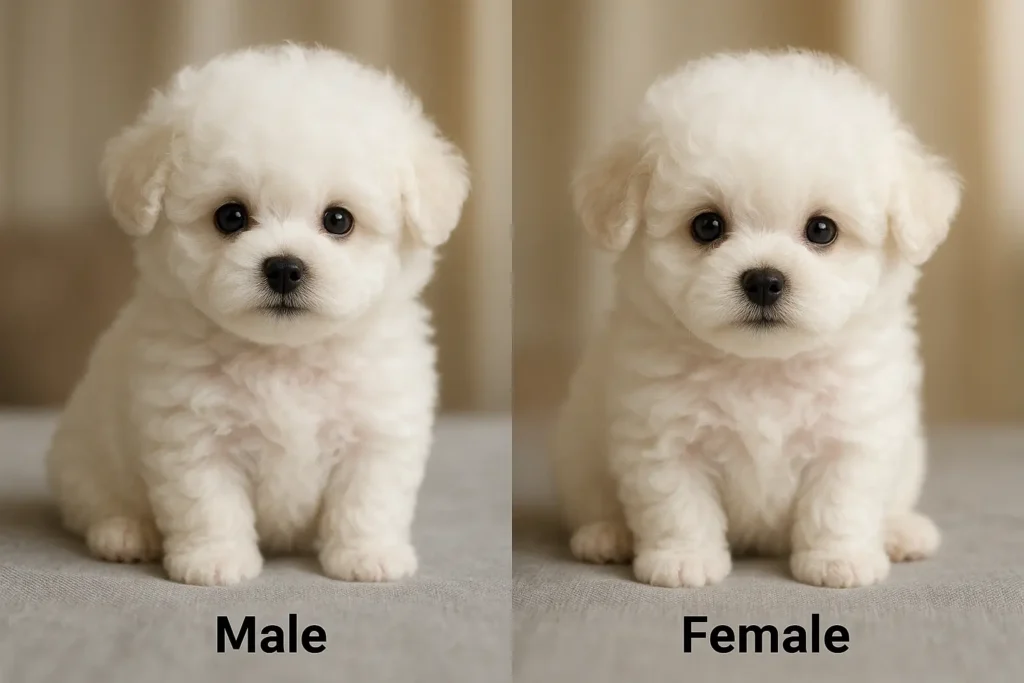
When it comes to choosing between a male or female teacup Bichon Frise puppy, the differences aren’t dramatic, but there are subtle traits in size and temperament that may help you decide which is the better fit for your family.
Size Differences
- Males: Usually a bit larger, averaging 6–9 pounds and standing 8–9 inches tall.
- Females: Slightly smaller, averaging 5–8 pounds and standing 7–8.5 inches tall.
Both are very small, but males often look sturdier while females appear more delicate.
Temperament
- Males: Typically more outgoing, goofy, and affectionate. They often act like little clowns and love constant attention.
- Females: Sometimes more independent and reserved. They’re still affectionate but may be a bit sassier or moodier than males.
Trainability
- Males: May test boundaries during puppyhood but respond well with consistent, positive reinforcement.
- Females: Often easier to focus during training but can be stubborn when they want their own way.
Family Fit
- Males: Great for families who want a playful, silly pup that thrives on interaction.
- Females: Better for owners who prefer a calm, slightly more independent dog.
What to Know Before You Buy or Rehome a Teacup Bichon Frise Puppy
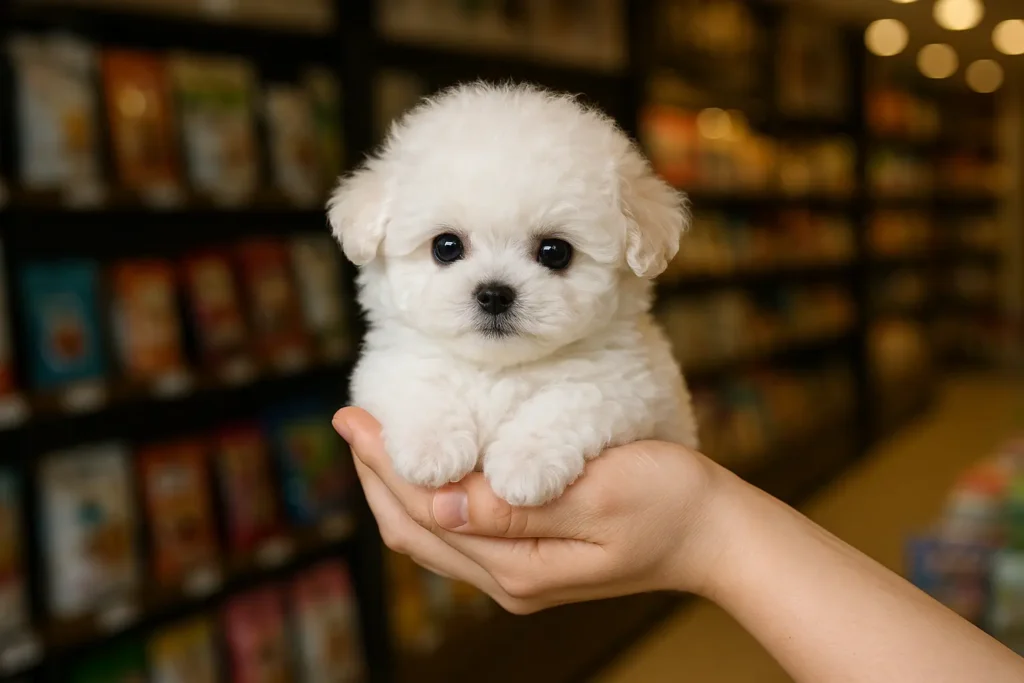
Before you bring home a teacup Bichon Frise puppy, there are some important things you should know. While these little fluffballs are adorable, their tiny size comes with extra care requirements, higher costs, and potential health concerns.
1. “Teacup” Is Not Official
The American Kennel Club only recognizes the standard Bichon Frise, not a teacup version. The term “teacup” is used by breeders to market smaller-than-average puppies, often created by breeding the smallest dogs in a litter. This can sometimes increase the risk of health issues.
2. Expect Higher Costs
Teacup Bichon puppies are rarer than standard-sized ones, which drives up their price. On average:
- Buying: $2,500–$5,000 USD depending on breeder, pedigree, and location
- Adoption: $50–$400 USD, though teacup Bichons are rarely found in shelters
On top of that, monthly care costs run around $80–$150 for food, vet visits, and grooming.
3. Health Risks
Because of downsizing, teacup Bichons may face more health issues than standard Bichons, such as:
- Hypoglycemia (low blood sugar) in young puppies
- Dental crowding due to tiny jaws
- Fragile bones (risk of injury from falls or rough play)
- Patellar luxation (slipping kneecaps)
- Skin allergies common to the Bichon breed
Always ask for health certificates and genetic testing results from breeders.
4. Grooming Commitment
Their fluffy, curly coats require regular brushing and grooming. Professional grooming is usually needed every 4–6 weeks, so be ready for ongoing coat care costs.
5. Lifestyle Match
- Perfect for apartment living thanks to their small size
- Thrive in families with gentle kids or seniors who want companionship
- Need company, they don’t tolerate being left alone for long periods
- Daily exercise: short walks and indoor play sessions are enough
6. Adoption vs Buying
- Adoption: Lower cost, saves a life, and often includes initial vetting. Downsized Bichons are rare but occasionally found through breed-specific rescues.
- Buying: Gives you control over size and lineage but comes at a much higher cost. Choose breeders who prioritize health, not just tiny size.
10 Facts About the Teacup Bichon Frise Puppy
The teacup Bichon Frise puppy is more than just an adorable fluffball. Behind that cloud-like coat lies a fascinating history and a personality that wins hearts everywhere. Here are 10 fun and useful facts about the breed:
- A Royal Favorite: Bichon Frises have a long history as companions to European nobility in France and Spain. Even their teacup counterparts carry that royal charm in a smaller package.
- Not an Official Size: “Teacup” Bichons aren’t recognized by the AKC. They’re simply smaller versions of the standard Bichon, bred selectively for tiny size.
- Low-Shedding and Hypoallergenic: Their curly double coat doesn’t shed much, making them popular among allergy-prone families.
- Pocket-Sized Companions: Full-grown teacup Bichons usually weigh only 5–9 pounds and stand 7–9 inches tall. Perfect for city living or small apartments.
- Long Lifespan: With proper care, teacup Bichons can live 12–15 years, sometimes even longer.
- Always Playful: They’re known as “forever puppies” because they stay playful and youthful well into their senior years.
- Sensitive Souls: Teacup Bichons are very in tune with their owners’ moods. Harsh voices or rough handling can easily upset them.
- Prone to Separation Anxiety: They love being around people and don’t like being left alone. Too much time apart can lead to barking or destructive behavior.
- Grooming Is a Must: That fluffy white coat may look heavenly, but it requires daily brushing and professional grooming every 4–6 weeks.
- Pricey Pups: Because they’re rare, teacup Bichon Frise puppies can cost anywhere from $2,500 to $5,000 USD.
Summary: Teacup Bichon Frise Puppy
The teacup Bichon Frise puppy is a tiny, cloud-like companion with a cheerful spirit and a heart full of love. Weighing only 5–9 pounds and standing 7–9 inches tall, this downsized version of the classic Bichon Frise is perfect for apartment living, seniors, or families who want a small, affectionate dog.
These pups are known for their playful, gentle, and social nature. They’re hypoallergenic, low-shedding, and thrive on human companionship. While their grooming needs are high, and they can be prone to separation anxiety, their affectionate personalities more than make up for the effort.
Teacup Bichons can live 12–15 years with proper care, making them a long-term, loving addition to the family. Though they come with a higher price tag, often $2,500 to $5,000 USD, their loyalty and charm make them priceless companions.
Frequently Asked Questions:
How much does a teacup Bichon Frise puppy cost?
A teacup Bichon Frise puppy typically costs $2,500 to $5,000 USD, depending on breeder reputation and lineage.
How long do teacup Bichon Frise puppies live?
With proper care, they live around 12–15 years, sometimes even longer.
Are teacup Bichon Frise puppies good with kids?
Yes, They’re gentle and affectionate, but best suited for older children who know how to handle small dogs carefully.

